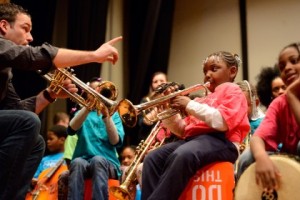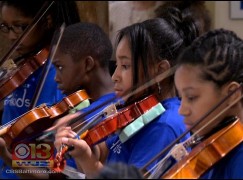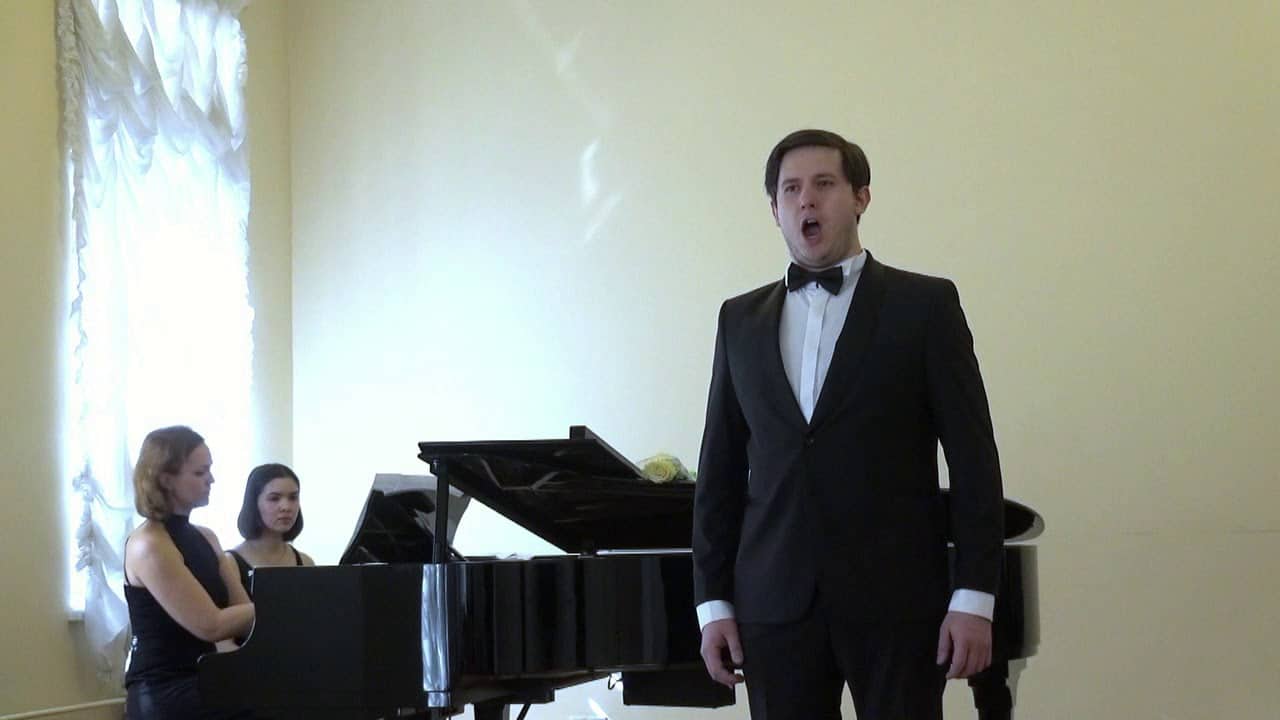Discovering the social limits of classical music – and El Sistema
mainIn the new issue of Standpoint, I take a drive on the wild side to assess whether classical music can do much to address a city’s social crisis. In other words, to see where the universal El Sistema remedy hits a brick wall.

The school, as we arrive, is in lockdown. Lockdown? “It’s what we do when there’s been a shooting,” says the young man who eventually lets us in. “Today, it’s just a practice drill.”
The last shooting was two weeks before, a drive-by burst that wounded five parents as they waited to collect their kids. No arrests were made. The police in Baltimore are themselves in lockdown since the death of an unarmed suspect. The city, briefly the nation’s capital after the British burned down Washington in 1812, is a tinderbox of racial tensions, a gaping black hole in the American dream.
I’m in West Baltimore, ten minutes’ drive from the Washington Memorial, and 40 from Barack Obama’s White House. It’s late afternoon. The streets are deserted, most houses derelict, barely a soul to be seen. The school I’m visiting is built like a high-security prison, with massive gangways for crowd control, neon lighting and steel shutters. It is after school hours and the students who have stayed behind, which is most of them, are playing stringed instruments or singing in a choir.
Sweetly, and incongruously….
Read on here.

If your first language is Chinese, you can read an authorised translation of the essay here.





This article injects a very useful dose of sceptical enquiry into a discussion that’s usually romanticized, at times to the point of absurdity. There’s little to argue with in most of it, with the exception of the paragraph on El Sistema in Venezuela, which is wrong in just about every respect.
El Sistema wasn’t “designed to rescue barrios urchins from drugs and guns” – it was designed to train up young, predominantly middle-class musicians for Venezuela’s orchestras. Go and check out its first constitution from 1979. The stuff about rescue came much later, when the program came under more pressure to justify its existence. Even now, this aspect is much exaggerated. The chorus accompanying La Bohème in Milan was the National Youth Choir, which includes people of all social strata, not a chorus of former street kids.
Its “stunning results” are musical, not social. There is no rigorous evaluation or compelling evidence that shows that it works as a social program, as even its main funder, the Inter-American Development Bank, has admitted. Indeed, Venezuela’s social problems have got worse as El Sistema has got bigger.
Given that El Sistema was not created to solve social problems in Venezuela, and there’s no good evidence that it does, it’s hardly surprising if it’s failing to do so outside Venezuela. Norman’s scepticism is more justified than he realises.
Interesting that the ONLY times that ENEMIGOPUBLICO (as the name evinces) comments are in ‘El Sistema’ related issues.
Luckily this time you didn’t bring up Gabriela Montero – but we had that discussion already so stopping it here. I think people get the picture very well.
Why not rename your user “Enemigodelsistema”? Its way more accurate.
No, I didn’t bring up Gabriela Montero, but you did, as usual, even though the article made no mention of her. You seem to have an unhealthy obsession. Let it go.
Did you have any comment about the content of the article or my response to it, or did you just come on here to be a nuisance?
I happen to agree a lot with your comment, but I can still sniff the smell of frustrated-right -wing-everythingrelatedtothecurrentvenezuelangovernmentisbad-thegooddaysoftheoligarchywerebetter sense.
As a latin american, its disgusting how the americans and europeans have embraced our music not for its merits, but because ‘El Sistema’ (like it or not) achieved something that none of their soooo savvy conductors and so intelligent managers and administrators could in decades: become news outside the dying niche of the arts.
Like a pack of wolves, EVERY administrator and every orchestra saw a panacea in El Sistema like pograms, not for sake of the society, but to USE the ‘social change claim’ to fulfill the grandiloquent airs of importance with which conservatories brainwash kids into believing that classical music should somehow be prominent.
“omfg, they are appearing on CNN by helping kids and playing ‘SABOR’ and LATIN MUSIC”….THAT must be the answer. The article itself narrates how Alsop saw a DVD and – rather than thinking if this is a program that would fit the Baltimore reality – the pavlov reaction is: “IT GENERATES LIKES/TWEETS/GOOD PR? LETS GO FOR IT!”
How many major orchestras embraced Revueltas, Ginastera, Marquez, et al, before El Sistema became news? Its hypocritical and disgusting.
Nowadays all you need to become a music director is “Ever conducted the Simon Bolivar? Check. Have fluffy hair? Check. Knows how to conduct ‘MAMBO’ by Bernstein? Check.–>HIRED!”
Shows just how much creativity, scholarship and innovation there is within the classical music community.
After a year of field research in Venezuela, Geoffry Baker’s book, “El Sistema: Orchestrating Venuzuela’s Youth” challenges the prevailing notions of El Sistema as a positive force of social change. See:
https://global.oup.com/academic/product/el-sistema-9780199341559?cc=us&lang=en&
To that is added an entirely different social and funding context for similar programs in the US. At first I suspected the book was just another anti-Chavista tome, but that is not its intention. It’s a sober ethnomusicological study of El Sistema.
Ahhh…..classical musicians trying to find their raison d’etre in a world that simply does not give a }*#$K about them. (Dont believe me? Look at the interview Phillipe Quint did just recently)
The fad of “music saves children and is a tool of social change” lasted just a bit more than “mozart is good for your baby” but its clearly cooling off.
The new trend that grew under everybody’s eyes is: “classical music is not specific compositions, but the instruments themselves”
Norman prefers to look elsewhere but the evidence mounts on by the ton.
The new normal in 5-10 years will be “pop music played in old instruments = classical music.”
Goodbye Bach, Bethoven and Mozart, its been real.
Excellent analysis.
The Muppets saw it coming too.
https://www.youtube.com/watch?v=t9ApIbDlk9Y
You can bring up all the irony you want, but the reality is that today’s Muppets could not even bring 5th symphony in their program because 99.9% of their audience would be “what is that”.
From the major labels (which wont die, as they have not for the past 15 years of ‘disruption’ from technology), only SONY and Universal still exist.
What is SONY recording these days??
2-CELLOS, Piano Guys, Yo YO Ma, Perlman and Bell. Anybody younger than 40 that actually does classical music? NOPE. once the latter 3 retire, THATS IT. no more ‘core’ classical music except in niche markets like France and Germany (if so).
What about Deutsche Grammophon?
Their Slogan is “DG IS classical music”…..then I guess THIS is classical music, right?
http://www.deutschegrammophon.com/us/cat/0735225
Count your blessings Michael. The world is changing faster than you wish to realize
Of course classical music is contracting e.g. in Europe due the ongoing process of abdicating it’s own culture, but it will be a very steady force in Asia for decades to come.
The infamous 40 million Chinese piano students of course don’t equal 40 million professional musicians ( God forbid, what a nightmare !! ), but it is an excellent foundation for securing a future audience in their own country.
I can report from first hand (e.g. Shanghai conservatory ) that there is a serious commitment and ferocious appetite for classical music that is quite simply stunning.
The many young faces in Chinese,Japanese and Korean concert halls also seem to point towards a future where not absolutely everybody under 25 automatically subscribes to the 3 1/2 minute format of commercial Pop.
So don’t be too disappointed when your eagerly awaited global Good Bye waving to Bach, Mozart and Beethoven might take a bit longer than you anticipated.
Europe is abdicating nothing- 40 million piano players being taken up with a foreign “exotic” art form does not mean understanding the art however well the mechanics are mastered .
Alvaro – is too gloomy -the art of music was never about social change – it is too
abstract an art to mean anything except what the listener brings to it .To take any stock in what the Quint video shows is foolish , look for the answer you want and you’ll find it in the right places . What is happening is ” evolution “.
What a poor article, Norman….you don’t identify any criteria for OrchKids being a “success” or “failure” besides saying ‘most of these kids will not win a scholarship to peabody or a job in the BSO’…….as if those two destinations were the only goal of this program (and as if they won’t make it to those places because you say so).
Here are the questions to ask: How many of your kids have graduated high school? How does that number compare with the average graduation rate of Baltimore Public Schools? How many in orchkids have earned music scholarships to colleges and universities in the US?
I didn’t see any of those questions broached before you wrote off OrchKids and Sistema as a ‘naive’ effort.
After-school music education is the future, and as a school music teacher and full time sistema instructor, I can tell you that there kids I’ve seen who have discovered something in this music that will propel their lives in a different, and richer, direction than if they hadn’t picked up these instruments.
No. It’s a good article, and fairer and more kind than much of the stuff put on this blog, which I and others have criticised. It raises a legitimate question and does not decree an answer.
However, I can’t think that introducing kids to music can do much harm, even if the good — to them, let alone to music –is minimal. Classical music may be going through a threatened phase — but if even a few of the Orchkids or Sistema grads can keep it alive, all is not lost.
I’m just trying to understand the grounds for his criticism. Geoff Baker had some very valid points of criticism in his work on Sistema in Venezuela (namely that top-down direct instruction is the exclusive method of teaching), and his proposed alternative of Brasil’s Pontos de Cultura is actually very intriguing.
I saw you in your visit to Baltimore, and you should have spent more time listening than talking. This is disappointing from you.